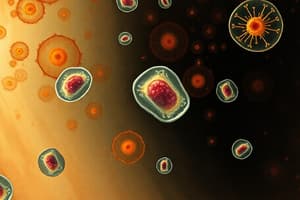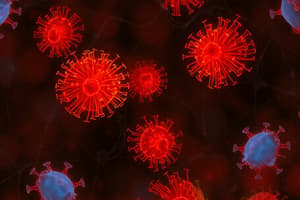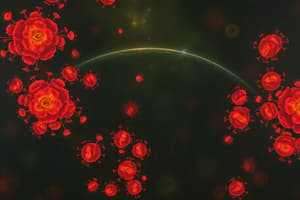Podcast
Questions and Answers
What is the role of MCHI in the recognition of infected body cells by Tc cells?
What is the role of MCHI in the recognition of infected body cells by Tc cells?
- MCHI is presented on the surface of healthy cells
- MCHI binds to free circulating antigens
- MCHI activates B cells to produce antibodies
- MCHI is presented on the surface of infected body cells (correct)
What antibody is responsible for providing infants with partial immunity through the placenta?
What antibody is responsible for providing infants with partial immunity through the placenta?
- IgG (correct)
- IgE
- IgM
- IgA
High levels of IgE are commonly associated with which condition?
High levels of IgE are commonly associated with which condition?
- Autoimmune diseases
- Viral diseases
- Allergic reactions (correct)
- Chronic infections
During the interaction between a mature Th cell and a naïve B cell, which of the following can occur?
During the interaction between a mature Th cell and a naïve B cell, which of the following can occur?
How does adaptive immunity differ from innate immunity in its response to pathogens?
How does adaptive immunity differ from innate immunity in its response to pathogens?
What triggers the release of cytokines that activate NK cells in an adaptive immune response?
What triggers the release of cytokines that activate NK cells in an adaptive immune response?
Which of the following statements accurately describes the function of antibodies?
Which of the following statements accurately describes the function of antibodies?
What facilitates B cells' change from producing IgM to another type of antibody?
What facilitates B cells' change from producing IgM to another type of antibody?
What is a primary role of plasma cells in the immune system?
What is a primary role of plasma cells in the immune system?
What happens when IgE antibodies cross-link with the same epitope of an antigen?
What happens when IgE antibodies cross-link with the same epitope of an antigen?
Where do T cells mature in the immune system?
Where do T cells mature in the immune system?
What is the main difference between Th1 and Th2 mediated pathways?
What is the main difference between Th1 and Th2 mediated pathways?
What is the role of MHC molecules in the immune response?
What is the role of MHC molecules in the immune response?
Flashcards
Antibody function
Antibody function
Antibodies bind to specific antigens on pathogens, marking them for destruction by other immune cells.
Antibody structure
Antibody structure
Antibodies bind to specific epitopes (parts) of antigens on pathogens.
T cell types
T cell types
Tc (cytotoxic) cells destroy infected cells; Th (helper) cells assist other immune cells.
B cell differentiation
B cell differentiation
Signup and view all the flashcards
MHC types
MHC types
Signup and view all the flashcards
Cytokines
Cytokines
Signup and view all the flashcards
B cell receptor
B cell receptor
Signup and view all the flashcards
Ligands in T cell interaction
Ligands in T cell interaction
Signup and view all the flashcards
Tc response vs. Th response
Tc response vs. Th response
Signup and view all the flashcards
How cells become infected by virus
How cells become infected by virus
Signup and view all the flashcards
IgG's role in immunity
IgG's role in immunity
Signup and view all the flashcards
High IgE levels
High IgE levels
Signup and view all the flashcards
Tc cell antigen binding
Tc cell antigen binding
Signup and view all the flashcards
Study Notes
Adaptive Immunity
- Antibodies identify foreign substances and activate immune responses
- Antibodies bind to the epitope of antigens on pathogens
- Antibodies are adaptive because they bind to specific antigens
- Different antibody types exist with varying roles and abilities to cross the placenta
- IgM is the earliest appearing antibody, can bind without prior exposure, and is involved in agglutination (clumping), often indicating bacterial infections.
- IgG crosses the placenta, activates complement systems, and neutralizes toxins by blocking epitopes.
- IgE is the least common antibody type, and is involved in allergic reactions.
T-Cells and Their Actions
- Tc cells are involved in cell-mediated immune responses
- Tc cells recognize infected cells through MHC I presentation
- Tc cells directly kill abnormal and infected cells (e.g., virus or cancer)
- Th cells secrete cytokines to determine the appropriate immune response and regulate B and Tc cell activities.
- Th cells require MHC II to be activated.
Antibody-Antigen Interactions
- TLR and PAMPs assist in distinguishing pathogens from healthy cells.
- B cell receptors and antibody-antigen complexes, as well as MHC II-T cell receptors, differ from each other in their structure and function.
Cytokines and Immune Responses
- Cytokines are signaling proteins that regulate immune responses
- Interleukins cause fever
- TNFs lead to apoptosis of body cells
- Various types of interferons activate specific immune cells
Antibody Class Switching
- Class switching is the process where B cells change from producing IgM to other antibodies like IgG or IgE
- Th cells and secreted cytokines encourage this process.
Complement Cascade
- The complement cascade is a process initiated when IgG antibodies interact with complement proteins
- The end product is an important component of the inflammatory response.
IgE and Allergic Reactions
- IgE antibodies can bind to mast cells, basophils, and eosinophils.
- Cross-linking IgE antibodies with the same antigen epitope triggers degranulation and histamine release, leading to vasodilation and anaphylaxis.
MHC and Antigen Presentation
- MHC I molecules are found on all body cells and present antigens to cytotoxic T cells
- MHC II molecules are found on antigen-presenting cells (APCs) and present antigens to helper T cells.
Adaptive Immunity and Innate Immunity Regulation
- Adaptive immunity regulates innate immune responses by activating and directing immune response cells.
Antibody Structure and Function
- Antibodies coat B cells and act as receptors for specific antigens.
- This combination can lead to a specific antibody response to an invader.
MHC and T-cell activities
- MHC I is found in all body cells
- MHC II is found on APCs, such as macrophages, dendritic cells and B cells.
Types of MHC
- MHC I: found in all body cells
- MHC II: found in APCs (macrophages, dendritic cells, B cells)
Adaptive Immunity and Innate Immunity Regulation
- Adaptive immunity regulates innate immune responses by activating and directing immune response cells.
Studying That Suits You
Use AI to generate personalized quizzes and flashcards to suit your learning preferences.




